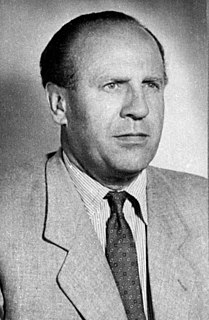A Quote by Simone de Beauvoir
Defending the truth is not something one does out of a sense of duty or to allay guilt complexes, but is a reward in itself.
Related Quotes
Not bodies produce sensations, but element-complexes (sensation-complexes) constitute the bodies. When the physicist considers the bodies as the permanent reality, the 'elements' as the transient appearance, he does not realise that all 'bodies' are only mental symbols for element-complexes (sensation-complexes).
My dad kept me away from people who treat children wrong. It's just amazing that there is such a way to raise a person without giving them complexes. But nobody does it. They think it should be the old school. But look at the products. Wouldn't it be great if you could avoid the complexes? Then you could deal with the complexes of life.
Out of the multitude of our sense experiences we take, mentally and arbitrarily, certain repeatedly occurring complexes of sense impression (partly in conjunction with sense impressions which are interpreted as signs for sense experiences of others), and we attribute to them a meaning the meaning of the bodily object.
Egotism erects its center in itself; love places it out of itself in the axis of the universal whole. Love aims at unity, egotism at solitude. Love is the citizen ruler of a flourishing republic, egotism is a despot in a devastated creation. Egotism sows for gratitude, love for the ungrateful. Love gives, egotism lends; and love does this before the throne of judicial truth, indifferent if for the enjoyment of the following moment, or with the view to a martyr's crown--indifferent whether the reward is in this life or in the next.
"Honor never grows old, and honor rejoices the heart of age. It does so because honor is, finally, about defending those noble and worthy things that deserve defending, even if it comes at a high cost. In our time, that may mean social disapproval, public scorn, hardship, persecution, or as always, even death itself.
The question remains: What is worth defending? What is worth dying for? What is worth living for?
Natural Giving: Anything we do in life which is not out of that energy, we pay for and everybody else pays for. Anything we do to avoid punishment, everybody pays for. Everything we do for a reward, everybody pays for. Everything we do to make people like us, everybody pays for. Everything we do out of guilt, shame, duty, or obligation, everybody pays for.
Segregation, as even the segregationists know in their hearts, is morally wrong and sinful. If it weren't, the white South would not be haunted as it is by a deep sense of guilt for what it has done to the Negro - guilt for patronizing him, degrading him, brutalizing him, depersonalizing him, thingifying him; guilt for lying to itself. This is the source of the schizophrenia that the South will suffer until it goes through its crisis of conscience.
Despite their differences, pride, shame, and guilt all activate similar neural circuits, including the dorsomedial prefrontal cortex, amygdala, insula, and the nucleus accumbens. Interestingly, pride is the most powerful of these emotions at triggering activity in these regions - except in the nucleus accumbens, where guilt and shame win out. This explains why it can be so appealing to heap guilt and shame on ourselves - they're activating the brain's reward center.
Philosophy by showing - including philosophy in literature - does truly valuable work in leading us to new perspectives from which our arguments can then begin. It does so by introducing new synthetic complexes, which we then reflect on from various points of view. When the complexes survive and grow, that initial showing has been philosophically decisive.
The reward of the young scientist is the emotional th
rill of being the first person in the history of the world to see something or to understand something. Nothing can compare with that experience The reward of the old scientist is the sense of having seen a vague sketch grow into a masterly landscape.






































